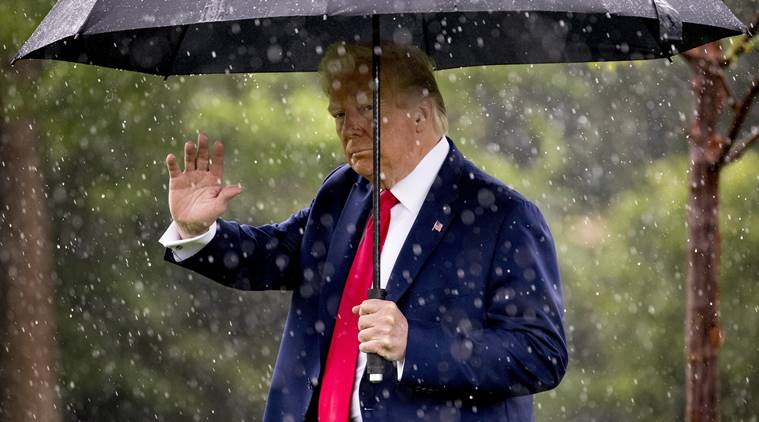 President Donald Trump waves to members of the media as he walks across the South Lawn of the White House in Washington, Thursday, before boarding Marine One for a short trip to Andrews Air Force Base, Md., and then on to Dallas for a fundraiser. (AP Photo/Andrew Harnik)
President Donald Trump waves to members of the media as he walks across the South Lawn of the White House in Washington, Thursday, before boarding Marine One for a short trip to Andrews Air Force Base, Md., and then on to Dallas for a fundraiser. (AP Photo/Andrew Harnik)
Donald Trump was criticised for his original decision to host the election rally on June 19 in the city of Tulsa — where one of the worst massacres of black people in US history was witnessed in 1921.
Trump on Friday announced that he had postponed his upcoming election rally in Tulsa, Oklahoma by a day, so it does not clash with Juneteenth, a popular annual holiday which commemorates the end of slavery in the United States.
“Many of my African American friends and supporters have reached out to suggest that we consider changing the date out of respect for this holiday, and in observance of this important occasion and all that it represents. I have therefore decided to move our rally to Saturday, June 20th, in order to honor their requests,” the US President tweeted on Friday night.
We had previously scheduled our #MAGA Rally in Tulsa, Oklahoma, for June 19th – a big deal. Unfortunately, however, this would fall on the Juneteenth Holiday. Many of my African American friends and supporters have reached out to suggest that we consider changing the date out…
— Donald J. Trump (@realDonaldTrump) June 13, 2020
This comes after Trump faced backlash for his original decision to host the rally on June 19 in the city of Tulsa — where one of the worst massacres of black people in US history was witnessed in 1921. In the wake of nation-wide anti-racism protests sparked by the custodial killing of George Floyd, Trump was widely accused of disrespecting the African American community due to the timing and location of his upcoming event.
With the event at Tulsa’s BOK centre, which can accommodate more than 19,000 people, Trump plans on kicking off his re-election campaign trail once again after it was stalled due to the coronavirus outbreak in March. His decision to hold the rally despite the rising number of Covid-19 cases in the US has raised concerns among health experts.
Earlier, during an interview with Fox News, the US President defended his decision to hold the event on June 19, amid the ongoing global health crisis. “Think about it as a celebration. My rally is a celebration,’ Trump said. “In the history of politics, I think I can say there’s never been any group or any person that’s had rallies like I do.”
Several people have criticised the President’s decision to host the rally on social media. Actress-comedian Chelsea Handler called the event a ‘white supremacist rally’, pointing out that it is scheduled to take place on the same day as the Tulsa Race Massacre.
The Tulsa Race Massacre took place in May of 1921. For 18 hours, white mobs tossed Molotov cocktails and torched churches and hospitals, killing 300 black people died. On Juneteenth, Trump will hold a rally there. Not any rally, a white supremacist rally.
— Chelsea Handler (@chelseahandler) June 11, 2020
Social media users also questioned how the events’ organisers planned to enforce social distancing regulations and other guidelines to combat the spread of Covid-19 and ensure the safety of all participants.
Tulsa' BOK Center, site of next week's Trump rally, is owned by @ASMGlobalLive, the huge venue management company. They could be asked: Is it responsible to host events that violate CDC distancing and mask guidelines? Do they routinely ask attendees to sign a waiver of liability?
— Bill Kristol (@BillKristol) June 12, 2020
"Come! Let's be bigoted! Don't sue me!" #TrumpSlogans
Also, look up the significance of Tulsa.#TrumpIsARacist
https://t.co/0hHW9bcrzh— Tracey Jane. 🌍🇪🇺🏴🇬🇧🌈🍻 (@TraceyJane12) June 12, 2020
Has @tulsaworld @TWSusanEll acted in OK public interest? Covid cases grow in OK & Trump wants rally on Juneteenth w no masks! Asking folk to sign away rights to sue when they overwhelm OK hospitals. Where is story on ‘Black wall street’ massacre in Tulsa? A racist rally on 6/19
— Julie (@JulieAnnLily) June 12, 2020
With over two million cases, the US is the worst-hit by the pandemic. More than 1,13,000 people have succumbed to the virus. Several public events, including election campaigns, were temporarily suspended in March in an attempt to mitigate the spread of the pandemic.